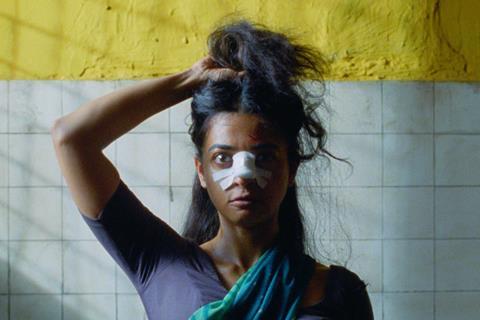Radhika Apte is sensational as a newly-married woman who discovers her wild side in this dark Mumbai-set comedy

Dir/scr: Karan Kandhari. UK/India/Sweden. 2024. 108mins
Getting to grips with her freshly-minted arranged marriage is proving to be a challenge for Uma (a phenomenal Radhika Apte). Newly arrived from the boondocks to Mumbai, she is confronted with a shack for a home and a booze-sodden sad-sack for a husband (Ashok Pathak). But just how fundamentally unsuited she is for a life of demure domesticity only becomes clear later in this droll, idiosyncratic black comedy by Karan Kandhari. The slightly erratic nature of the storytelling is balanced out by a lot of swearing, a fair helping of gore and some pleasingly lo-fi stop-motion animation. But the film’s main asset is Apte, a gifted physical comedian who puts the dead into deadpan, and loads every gesture with an aggressive, almost demented slap-stick infused humour.
A distinctive and unusual addition to the Hindi language cinema canon
This Directors Fortnight premiere is a distinctive and unusual addition to the Hindi language cinema canon is an eye-catching calling card for multidisciplinary artist and filmmaker Kandhari, predominantly based in London.
The picture may be set in India and, in Apte, have a star who is acclaimed in mainstream Bollywood (she broke through with supporting roles in Badlapur and Hunterrr, both in 2015), India’s indie film industry and in television (she earned an International Emmy nomination for the 2018 Netflix production Lust Stories), but Sister Midnight’s influences are wide-ranging and global. Music choices are gleefully promiscuous – Motorhead rubs shoulders with crunchy old American blues numbers and swooning vintage Cambodian soundtracks. There’s shared blood with Ana Lily Amirpour’s A Girl Walks Home Alone At Night in the story’s gristle but also a wryly absurdist flavour that wouldn’t feel amiss in a Kaurismaki film.
Kandhari deftly sets the scene for Uma’s disappointing entrance into the world of marriage with an extended, dialogue-free sequence. She’s wide-eyed and rigid in the train back to Mumbai; her husband is slumped and comatose, his wedding attire limp and flaccid; the first night in the new home is an exaggerated pantomime of awkwardness. Apte, who can load a movement as simple as a wave of her hand with hilarious tragedy, clearly doesn’t need dialogue to tell a story. But when she finally does get to speak (turning the air several shades of blue when she does so), she wields her lines like a machete.
Apte’s use of her body in the role is one of the film’s key pleasures. Initially intimidated by the clattering onslaught of sound from the street outside, she sits, frozen, like a wild animal shocked into immobility. Her arms, shackled in her shiny wedding bangles, are stiff with irritation. But as she grows in confidence – a friendship with a neighbour who is almost as pissed-off as Uma helps – she stomps around the city with a seething intensity. There is a brisk, impatient quality to the editing that mirrors Uma’s personality. Editor Napoleon Stratogiannakis (Suntan, Apostasy) ends scenes with the emphatic finality of a cleavered-off limb.
The audacious swerve taken by the story midway through will leave the audience with questions. Principally, what is Uma? When did she become whatever she is? What prompted her thirst for the blood of birds, goats and other larger creatures? These are largely glossed over but one thing is certain: Uma is not the marrying kind.
Production company: Wellington Films, Griffin Pictures
International sales: Protagonist Pictures info@protagonistpictures.com
Producers: Alastair Clark, Anna Griffin, Alan McAlex
Cinematography: Sverre Sørdal
Production design: Shruti Gupte
Editing: Napoleon Stratogiannakis
Music: Paul Banks
Main cast: Radhika Apte, Ashok Pathak, Chhaya Kadam, Smita Tambe, Navya Sawant

























No comments yet